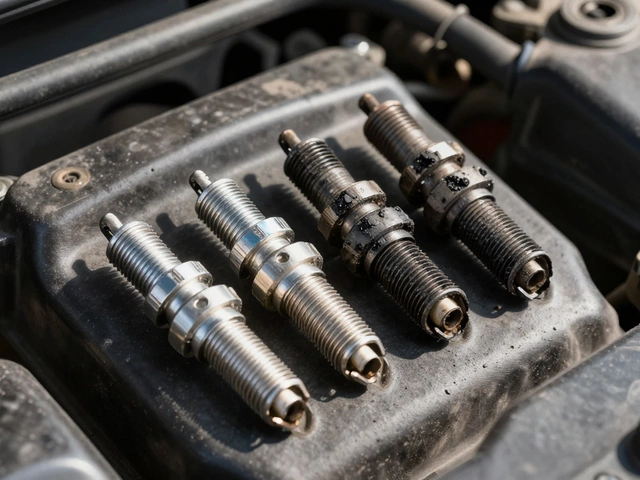So, you're hearing strange noises from your car, and you're thinking, 'Is that my fuel pump?' You're not alone. A failing fuel pump can make your car sound like it's got its own little percussion section going. But identifying these sounds isn't just a party trick; it can save you from bigger headaches down the road.
Firstly, there's the whining sound. If your fuel pump is on its last legs, it might whine louder than your last karaoke session. It's that high-pitched, almost screech-like sound coming from the fuel tank area. Now, not every whine means imminent failure, but it's a sign to get it checked out.
Then there’s the infamous sputtering or jerking, especially when you're pushing your car to hit that speed limit or going uphill. Imagine it's like when you’re trying to slurp the last bits of a smoothie through a straw and you're just getting air. That’s your engine's way of saying it's not getting the fuel it needs.
Staying ahead of these noises and addressing them promptly can mean the difference between a smooth drive and a ride filled with anxiety. So, if you've picked up on any of these sounds, it might be time to give your fuel pump the attention it deserves.
- Recognizing the Sounds
- When the Buzz Becomes a Problem
- Why You Shouldn't Ignore Whining
- Rumbles and Sputters: Time to Act
- Tips for a Quieter Ride
- Preventive Measures
Recognizing the Sounds
Alright, let’s get down to the nitty-gritty. Recognizing a failing fuel pump isn't just about hearing noises; it's about knowing which noises to listen for. Understanding this can really help you catch problems early and keep your ride running smoothly.
Common Noises Made by a Failing Fuel Pump
One of the most common symptoms is a whining or humming sound. This noise often comes from the rear of your car, where the fuel tank is located. It's usually more noticeable when the car is just idling. A car trouble checklist should always begin with listening for unusual noises.
An irregular buzzing sound is another sign. Buzzing can suggest wear and tear inside the fuel pump, something that might lead to more serious problems if left unchecked. Though an electric fuel pump humming a little isn't unusual, louder and more persistent noise is a red flag.
What Noises Mean
But what if your car isn't just getting louder, but it’s also jerking or struggling to accelerate? These behaviours might be accompanied by a kind of sputtering. Imagine picking up a rock while vacuuming—it’s that kind of struggle for your engine when it can’t get fuel smoothly. Engine noise, especially when accelerating or under load, should never be ignored.
- Whining: Could mean the pump is near its breaking point.
- Buzzing: Indicates internal wear and tear, demanding immediate attention.
- Sputtering: Your engine's way of showing it’s hungry for fuel.
Heard any of these? It’s time to pay a visit to your mechanic before a simple repair becomes a much pricier repair job. Use any odd sounds as cues to keep your car's automotive maintenance up-to-date.
So next time you kick back in your driver's seat, turn down the radio and listen to what your car might be trying to say. Being in-tune with these engine noises can save you a lot of time and money in the long run.
When the Buzz Becomes a Problem
You hear a low, persistent buzz coming from your car, but is it a cause for concern? That buzzing noise could very well be a sign that your fuel pump is begging for attention. Let's dissect why this sound should be on your radar.
First off, the buzzing noise can mean your fuel pump's electric motor is straining harder than usual. This happens when it’s starting to wear out, which could affect how efficiently it delivers gas to your engine. When the fuel pump works extra hard, not only does it get noisier, but it also becomes less reliable.
What Causes the Buzz?
Several factors could turn your fuel pump into a wannabe rockstar:
- Clogged Fuel Filter: A dirty or clogged fuel filter makes the pump work overtime, causing that buzz. Change filters regularly to prevent this.
- Low Fuel Levels: Consistently running on low fuel heats the pump and wears it out, making it noisy.
- Age and Wear: Let’s face it, all parts wear out, and a fuel pump is no exception, especially after logging many miles.
Ignoring this low harmony can lead to dire consequences, like getting stranded mid-drive or facing a hefty repair bill. Keeping an ear out for these sounds and acting quickly can save lots of trouble.
Steps to Take
- Listen: Pay attention to frequency and consistency. Is it loud? Does it seem abnormal for your vehicle?
- Check Your Fuel Level: Running low often? Time to change those habits before it affects your pump.
- Consider Professional Help: You might not want to mess around too much on your own. Let a pro diagnose it.
Turning a deaf ear to your car's sounds doesn't do any favors. Listen to your vehicle and tackle these issues head-on. It definitely beats the inconvenience of dealing with a failed fuel pump at the worst time!
Why You Shouldn't Ignore Whining
You're cruising down the road, and suddenly your car sounds like it’s pining for attention, with a high-pitched whine from the back. Don't just dismiss it as an added feature of your car's ambient soundtrack. Ignoring this engine noise could leave you stranded faster than you think.
When a fuel pump starts whining, it's often a cry for help. This sound generally means your pump is struggling to draw fuel from the tank. Imagine it's wheezing like a marathon runner who hasn't trained—you won't expect them to finish strong. If you ignore this and keep driving, you're basically signing up for a future breakdown on the shoulder.
Risk of Engine Failure
One of the biggest reasons not to ignore a whiny pump is the risk of engine failure. The whine indicates that the fuel pump may soon lose its ability to efficiently supply fuel to the engine. Without a consistent supply, your engine's performance can drop significantly, or worse, fail entirely, especially during high-speed drives or uphill climbs.
Increased Repair Costs
Hoping the noise will fix itself can end up being expensive. A simple pump replacement—often more affordable if done early—could become a full-blown fuel system overhaul if neglected. It's like choosing between getting a small cavity filled or waiting until you need a root canal.
- Listen for the wine at startup or while driving.
- If you hear it, schedule a check-up sooner rather than later.
- Addressing the issue early saves both time and money.
Keeping an ear out for these noises does more than just provide peace of mind. It actively safeguards your car and wallet from future troubles. Next time you hear that whine, consider it a not-so-subtle hint to give your trusty mechanic a call.

Rumbles and Sputters: Time to Act
If you've ever felt your car rattle or hesitate when you hit the gas, your fuel pump might be trying to tell you something. These rumblings and sputters aren't just quirks—they're legit cries for help from your car.
Rumbles often occur when the fuel pump struggles to deliver gas to the engine smoothly. This can be super noticeable when accelerating or climbing hills. It’s a clear shout-out that things are out of whack and need your attention.
Sputtering State
Now, let's talk about sputtering. Imagine cruising down the highway, and then bam—your car suddenly stutters as if it's about to give up. That jerking sensation isn't just jolting; it's a definite sign of fuel delivery problems. This can be due to a struggling fuel pump not providing enough juice to the engine.
What’s going on inside? A worn-out pump or clogged fuel filter can seriously disrupt the flow, leaving your engine gasping for more. If left unchecked, this can lead to engine misfires and eventually a car that won't start at all.
What You Can Do
- Check the fuel filter: Sometimes, it’s a clogged filter that's messing things up. Replacing it can solve the sputtering.
- Inspect the fuel lines: Look for any leaks or kinks that might be choking the fuel supply.
- Listen carefully: If the sputtering is often, get your car inspected by a professional to determine if the fuel pump needs replacing.
Being proactive when you hear and feel these signs can stave off bigger issues. Remember, these are not just annoying sounds or sensations—they're signals that your car's health might be at risk.
Tips for a Quieter Ride
If you're tired of playing guess-the-noise with your car, there are ways to get that ride a little quieter so you can enjoy your tunes without any disturbances. First off, a little engine TLC goes a long way. Keeping up with regular maintenance is like giving your car a spa day. Treating it with a thorough check-up means fewer surprises.
Maintenance is Key
A well-maintained engine is less likely to produce that annoying engine noise. Think of it like brushing your teeth—you don’t want any surprises at the dentist! Regular oil changes, air filter checks, and timely fuel system cleanings can make a significant difference.
Fuel Quality Matters
Next up: fuel quality. Yes, it really does matter what you feed your car. Using high-quality fuel helps prevent deposits that might clog up your fuel pump system. Feel like giving your car a special treat? Consider adding a fuel system cleaner every now and then.
Listen for Changes
Paying attention to any new noises—or the absence of old ones—can be a game-changer. If your usual driving soundtrack suddenly includes a whining or sputtering you’ve never heard before, don't just turn up the volume and ignore it.
- Weekly inspections: Don't just wash the outside. Pop the hood and give it a glance.
- Monthly fuel system cleaner: It's like a detox for your car. Keeps everything running smoothly.
- Biannual professional check-ups: Just like going to the doctor—even if you feel fine, a check-up never hurts.
Following these tips isn’t just about keeping your ride quiet. It’s also about extending the life of your car and making sure you’re not stranded waiting for a tow truck because you missed the signs of a failing system.
Preventive Measures
Alright, time to dive into what you can actually do to keep your fuel pump from giving up on you in the middle of nowhere. We all know prevention is better than a cure, especially when it comes to car troubles.
Regular Fuel Filter Replacements
Think of the fuel filter as the gatekeeper for junk trying to mess with your fuel pump. Over time, this filter can get clogged, forcing the pump to work overtime. Replace it every 20,000 to 30,000 miles, depending on your car's manual. It's one of the easiest and cost-effective ways to extend your pump's life.
Keep Your Tank Fashionably Full
Running on empty is not just stressful but also damaging. The fuel pump is cooled by the fuel, so constantly running on low means it's missing its chill time, leading to overheating and wear. Try to keep your tank at least a quarter full.
Good Quality Fuel
Not all fuels are created equal. Low-grade gas can introduce dirt and moisture, complicating things for your fuel pump. Stick with reputable stations, and if you feel fancy, a tank cleaner every now and then doesn’t hurt.
Listen and Inspect
Odd noises are your car's way of asking for help. Occasional inspections by a mechanic can catch issues before they become full-blown problems. A professional's ear might pick up something you haven’t noticed.
Adopting a Regular Maintenance Schedule
| Checkup | Frequency |
|---|---|
| Fuel Filter Change | 20,000 - 30,000 miles |
| Oil Change | 5,000 - 7,500 miles |
| General Inspection | Every 6 months |
Maintaining your car with regular checkups makes sure that all parts, including your fuel pump, work in harmony. A small investment in time and routine care can save you from unexpected fuel pump failures and the chaos that usually follows.







Write a comment